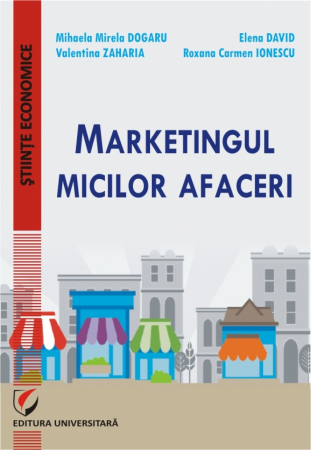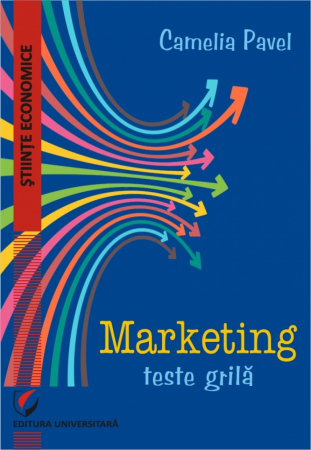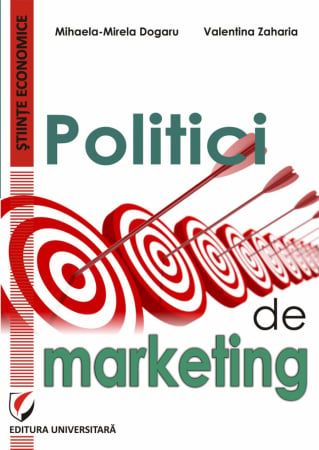Manuscript proposals: [email protected] / 0745 204 115 //// Tracking orders Individuals / Sales: 0745 200 357 / Orders Legal entities: 0721 722 783
ISBN: 978-606-28-1437-3
DOI: https://doi.org/10.5682/9786062814373
Publisher year: 2022
Edition: I
Pages: 172
Publisher: Editura Universitară
Author: Cristina Turcanu
Product Code:
9786062814373
Do you need help?
0745 200 357
- Description
- Download (1)
- Authors
- Content
- More details
- Reviews (0)
In this paper we look at rural education from a marketing perspective, break it down into elements of the marketing mix and direct the attention of researchers and decision makers to the complexity of the conditions in which rural education takes place, we encourage reflection on sustainable actions as an integral part of the process. social evolution because an inclusive and quality education for all, without barriers to access, disparities, school segregation, is an essential element of sustainable development.
The aim of the paper is to identify effective measures to improve the education system in rural areas that increase the quality of education of children in this environment considered disadvantaged.
The main objective aims to highlight those factors that can contribute to reducing the barriers that restrict the access of rural children to education (both in terms of the material component, namely the learning conditions, and the spiritual one related to the complementary dimensions, consisting in the quality of teaching activities). , related services offered and last but not least, quality of life of the student) in the context in which the projects containing such proposals can be financed by the European Union within the Operational Programs dedicated to Human Capital.
The information obtained as a result of this study will contribute to the substantiation of the research that will be carried out in order to formulate proposals and solutions in order to improve the quality of education and increase the attractiveness of Romanian education in rural areas.
The aim of the paper is to identify effective measures to improve the education system in rural areas that increase the quality of education of children in this environment considered disadvantaged.
The main objective aims to highlight those factors that can contribute to reducing the barriers that restrict the access of rural children to education (both in terms of the material component, namely the learning conditions, and the spiritual one related to the complementary dimensions, consisting in the quality of teaching activities). , related services offered and last but not least, quality of life of the student) in the context in which the projects containing such proposals can be financed by the European Union within the Operational Programs dedicated to Human Capital.
The information obtained as a result of this study will contribute to the substantiation of the research that will be carried out in order to formulate proposals and solutions in order to improve the quality of education and increase the attractiveness of Romanian education in rural areas.
-
Features of educational marketing in rural Romania
Download
CRISTINA TURCANU
INTRODUCTION / 7
CHAPTER 1. ANALYSIS OF THE CURRENT STATE OF KNOWLEDGE IN THE FIELD OF EDUCATIONAL MARKETING / 11
1.1. Establishing the context and importance of the subject for society / 11
1.2. Marketing orientation in education / 15
CHAPTER 2. MARKETING PERSPECTIVE IN THE RURAL EDUCATIONAL SYSTEM / 18
2.1. Consumer of educational services / 18
2.2. Marketing environment / 23
2.3. Marketing mix / 35
2.3.1. Product / Service / 35
2.3.2. The price / 39
2.3.3. Placement / Distribution / 42
2.3.4. Promotion / 44
2.3.5. Staff / 46
2.3.6. The trial / 49
2.3.7. Physical evidence / 53
2.3.8. Perseverance in the strategic approach of the principles of sustainable development / 54
CHAPTER 3. COORDINATES OF THE ROMANIAN RURAL ENVIRONMENTAL EDUCATION SYSTEM / 59
3.1. The Romanian education system in international statistics / 61
3.2. Evolution of statistical indicators regarding the Romanian education system in rural areas / 65
3.3. Investments in educational programs for rural education / 69
3.4. Conclusions / 75
CHAPTER 4. QUALITATIVE RESEARCH ON THE APPLICATION OF THE PRINCIPLES OF SUSTAINABILITY IN EDUCATION FROM THE PERSPECTIVE OF TEACHERS / 77
4.1. Research objectives / 78
4.2. Research methodology / 78
4.3. Results and discussions / 80
4.4. Conclusions and recommendations / 85
CHAPTER 5. MARKETING EXPERIMENT REGARDING MEASURING THE EFFICIENCY OF A “SCHOOL AFTER SCHOOL” TYPE EDUCATIONAL PROGRAM IMPLEMENTED IN RURAL ENVIRONMENT / 88
5.1. Research objectives and methodology / 89
5.2. Research and discussion results / 91
5.3. Conclusions of the marketing experiment / 93
CHAPTER 6. QUANTITATIVE MARKETING RESEARCH ON THE EFFECTS OF THE COVID HEALTH CRISIS ‑ 19 ON EDUCATION IN ROMANIA / 95
6.1. Justification and purpose of the research / 97
6.2. Research objectives / 97
6.3. Research hypotheses / 98
6.4. Considerations regarding the research methodology / 100
6.5. The results of the survey on the effects of Covid ‑ 19 on education and discussions / 106
6.6. Conclusions and discussions / 122
CHAPTER 7. MARKETING STRATEGIES FOR RURAL SCHOOLS IN ORDER TO ALIGN WITH THE SYSTEMIC VISION "EDUCATION UNES US" / 126
GENERAL CONCLUSIONS / 147
BIBLIOGRAPHY / 150
CHAPTER 1. ANALYSIS OF THE CURRENT STATE OF KNOWLEDGE IN THE FIELD OF EDUCATIONAL MARKETING / 11
1.1. Establishing the context and importance of the subject for society / 11
1.2. Marketing orientation in education / 15
CHAPTER 2. MARKETING PERSPECTIVE IN THE RURAL EDUCATIONAL SYSTEM / 18
2.1. Consumer of educational services / 18
2.2. Marketing environment / 23
2.3. Marketing mix / 35
2.3.1. Product / Service / 35
2.3.2. The price / 39
2.3.3. Placement / Distribution / 42
2.3.4. Promotion / 44
2.3.5. Staff / 46
2.3.6. The trial / 49
2.3.7. Physical evidence / 53
2.3.8. Perseverance in the strategic approach of the principles of sustainable development / 54
CHAPTER 3. COORDINATES OF THE ROMANIAN RURAL ENVIRONMENTAL EDUCATION SYSTEM / 59
3.1. The Romanian education system in international statistics / 61
3.2. Evolution of statistical indicators regarding the Romanian education system in rural areas / 65
3.3. Investments in educational programs for rural education / 69
3.4. Conclusions / 75
CHAPTER 4. QUALITATIVE RESEARCH ON THE APPLICATION OF THE PRINCIPLES OF SUSTAINABILITY IN EDUCATION FROM THE PERSPECTIVE OF TEACHERS / 77
4.1. Research objectives / 78
4.2. Research methodology / 78
4.3. Results and discussions / 80
4.4. Conclusions and recommendations / 85
CHAPTER 5. MARKETING EXPERIMENT REGARDING MEASURING THE EFFICIENCY OF A “SCHOOL AFTER SCHOOL” TYPE EDUCATIONAL PROGRAM IMPLEMENTED IN RURAL ENVIRONMENT / 88
5.1. Research objectives and methodology / 89
5.2. Research and discussion results / 91
5.3. Conclusions of the marketing experiment / 93
CHAPTER 6. QUANTITATIVE MARKETING RESEARCH ON THE EFFECTS OF THE COVID HEALTH CRISIS ‑ 19 ON EDUCATION IN ROMANIA / 95
6.1. Justification and purpose of the research / 97
6.2. Research objectives / 97
6.3. Research hypotheses / 98
6.4. Considerations regarding the research methodology / 100
6.5. The results of the survey on the effects of Covid ‑ 19 on education and discussions / 106
6.6. Conclusions and discussions / 122
CHAPTER 7. MARKETING STRATEGIES FOR RURAL SCHOOLS IN ORDER TO ALIGN WITH THE SYSTEMIC VISION "EDUCATION UNES US" / 126
GENERAL CONCLUSIONS / 147
BIBLIOGRAPHY / 150
Although rural education has gained the attention of illustrious researchers over time, and mankind has learned about the specifics of education in this environment, there are still many aspects that we need to better understand about this complex process. Cognitive, social, but especially emotional transitions have the power to elevate some in knowledge, to elevate them in the social hierarchy, and to motivate them by increasing their self-confidence and self-esteem, but when its strength it is not properly oriented, it can also cause substantial trauma. There is also much to understand about the specific types of support that students and teachers in rural education need to maximize their intended outcomes.
Understanding education as fundamental to both a nation's economic progress and to its professional and individual journey, the 2030 UN Agenda for Sustainable Development aims at unrestricted access to equitable education with a high level of quality at all stages of life. It also aims to eliminate gender and income disparities in access to education, drawing attention to the situation of people with a low level of education, who not only face greater difficulties in the labor market, but also have a high risk of poverty and social exclusion. Mankind seems to have understood that a "one size fits all" approach to education policy and its implementation makes it possible to overlook and ignore important aspects of life and the needs of communities. The realities facing people in rural areas cannot always be addressed through a policy made "elsewhere" and for "everyone". Maintaining quality must be a long-term perspective for education no matter where it takes place, and short-term gains in "mass education", where "number play" is a testament to success, must not overshadow the need for quality.
The goal of educational efforts must be to leave a new generation better, more educated, better prepared so that they can easily integrate into society. The formative and educational character of the schools is closely related to their role of social propellant. The researchers point out that a well-organized education will produce strong personalities, whose spirit will materialize in the development of the communities to which they belong. The strategy of innovative development of education and the priority directions of the state education policy raise issues related to the content of modern education and the availability of students for self-realization and life in modern society. The development of the knowledge society in the 21st century is characterized by the widening of the limits of knowledge, the shortening of the life cycle of knowledge and the emergence of new knowledge at a very fast pace. As a result, learning is becoming more and more of a lifelong process that never ends.
In this paper we look at rural education from a marketing perspective, break it down into elements of the marketing mix and direct the attention of researchers and decision makers to the complexity of the conditions in which rural education takes place, we encourage reflection on sustainable actions as an integral part of the process. social evolution because an inclusive and quality education for all, without barriers to access, disparities, school segregation, is an essential element of sustainable development.
The aim of the paper is to identify effective measures to improve the education system in rural areas that increase the quality of education of children in this environment considered disadvantaged.
The main objective aims to highlight those factors that can contribute to reducing the barriers that restrict the access of rural children to education (both in terms of the material component, namely the learning conditions, and the spiritual one related to the complementary dimensions, consisting in the quality of teaching activities). , related services offered and last but not least, quality of life of the student) in the context in which the projects containing such proposals can be financed by the European Union within the Operational Programs dedicated to Human Capital.
The information obtained as a result of this study will contribute to the substantiation of the research that will be carried out in order to formulate proposals and solutions in order to improve the quality of education and increase the attractiveness of Romanian education in rural areas.
In this paper the first chapter is dedicated to the conceptual and methodological aspects of educational marketing, analyzing the current state of knowledge through a systematic approach to reviewing the literature in order to identify the main issues addressed by researchers from the perspective of educational marketing.
Chapter two provides a holistic understanding of the education market from a marketing perspective, with particularities in rural areas. Thus, a synthesis of the researches carried out so far in the field of educational marketing is presented, which analyzes specific aspects of the rural environment, in order to identify some research directions insufficiently explored on this market niche. The association between the marketing vision and the rurality of education is a novelty, recently becoming a topic of interest in the scientific field, whose approach can lead to obtaining relevant information that will be able to substantiate strategic decisions on rural education. The synthesis is based on studies that have tried to characterize the practical implementation of marketing mechanisms in schools around the world.
Considering the fact that the statistics made at international level place Romania below the averages registered at the level of European countries for most of the indicators that describe the quality of education, it appeared necessary to carry out, in chapter three, an analysis aimed at shaping an image from the rural environment from the perspective of the following coordinates: accessibility, the degree of absorption of European funds and the integration of sustainability principles that reflect the institutional and administrative capacity of the education system to ensure unrestricted access to quality educational experiences for each child and to attract financial resources. improving rural education by implementing programs and projects in accordance with the specific needs of rural communities and, at the same time, correlated with the sustainable development objectives applicable in the educational field.
Chapter four contains a qualitative marketing research that aimed to obtain an image of the Romanian education system, this time from the perspective of teachers who know the reality on the ground and not from existing statistics. In this approach, using the method of the semi-structured in-depth interview, their opinions on the capacity of the educational system to create opportunities and to ensure all children the chance to benefit from quality educational services were identified and proposals for educational measures and programs were outlined. to increase the chances of students from rural areas to follow a form of higher education and to align the Romanian educational system with the principles of social sustainability.
Chapter five presents a marketing experiment that aims to determine whether, following the implementation of a “school-by-school” educational training program in rural areas, the preschoolers and the beneficiary schoolchildren are making progress in terms of the level of skills acquired as a result. of their participation in this program and whether the development of such an educational program complementary to the compulsory one represents a real support for these children from rural areas, most of them coming from families with a precarious socio-economic situation who cannot "invest" in their education.
The novelty brought by the Covid pandemic ‑ 19 and the new conditions experienced by students and teachers required a moment of reflection, because after a certain type of pause, of stillness born of the novelty of events, life had to continue and education as well. In this context, in chapter six, the paper analyzes, based on a quantitative marketing research, specific aspects of the influence of the Covid pandemic ‑ 19 on education in Romania, from the perspective of digitizing educational activities carried out between teachers and children. The aim is to determine the way in which children's education has been affected by the changes imposed by the measures regarding social distancing, with particularization on rural-urban disparities, in order to outline some suggestions regarding a future equitable and quality education strategy for all children. from Romania. Based on the results of the research undertaken, chapter seven proposes marketing strategies and actions addressed to rural schools so that they contribute to achieving the objectives of the systemic vision "Education unites us", for which there is a current national action plan designed in the form a program of education reform in Romania for the next period, whose perspectives have been translated into specific objectives and actions for rural education.
Achieving the goal for which it was started, this work is a manifesto for rethinking learning and education so as to suit the needs of the changing world and especially the sensitivity of certain social categories, as traditional ways of implementing education are not enough. The change in society must be achieved through an education that itself needs rethinking.
Understanding education as fundamental to both a nation's economic progress and to its professional and individual journey, the 2030 UN Agenda for Sustainable Development aims at unrestricted access to equitable education with a high level of quality at all stages of life. It also aims to eliminate gender and income disparities in access to education, drawing attention to the situation of people with a low level of education, who not only face greater difficulties in the labor market, but also have a high risk of poverty and social exclusion. Mankind seems to have understood that a "one size fits all" approach to education policy and its implementation makes it possible to overlook and ignore important aspects of life and the needs of communities. The realities facing people in rural areas cannot always be addressed through a policy made "elsewhere" and for "everyone". Maintaining quality must be a long-term perspective for education no matter where it takes place, and short-term gains in "mass education", where "number play" is a testament to success, must not overshadow the need for quality.
The goal of educational efforts must be to leave a new generation better, more educated, better prepared so that they can easily integrate into society. The formative and educational character of the schools is closely related to their role of social propellant. The researchers point out that a well-organized education will produce strong personalities, whose spirit will materialize in the development of the communities to which they belong. The strategy of innovative development of education and the priority directions of the state education policy raise issues related to the content of modern education and the availability of students for self-realization and life in modern society. The development of the knowledge society in the 21st century is characterized by the widening of the limits of knowledge, the shortening of the life cycle of knowledge and the emergence of new knowledge at a very fast pace. As a result, learning is becoming more and more of a lifelong process that never ends.
In this paper we look at rural education from a marketing perspective, break it down into elements of the marketing mix and direct the attention of researchers and decision makers to the complexity of the conditions in which rural education takes place, we encourage reflection on sustainable actions as an integral part of the process. social evolution because an inclusive and quality education for all, without barriers to access, disparities, school segregation, is an essential element of sustainable development.
The aim of the paper is to identify effective measures to improve the education system in rural areas that increase the quality of education of children in this environment considered disadvantaged.
The main objective aims to highlight those factors that can contribute to reducing the barriers that restrict the access of rural children to education (both in terms of the material component, namely the learning conditions, and the spiritual one related to the complementary dimensions, consisting in the quality of teaching activities). , related services offered and last but not least, quality of life of the student) in the context in which the projects containing such proposals can be financed by the European Union within the Operational Programs dedicated to Human Capital.
The information obtained as a result of this study will contribute to the substantiation of the research that will be carried out in order to formulate proposals and solutions in order to improve the quality of education and increase the attractiveness of Romanian education in rural areas.
In this paper the first chapter is dedicated to the conceptual and methodological aspects of educational marketing, analyzing the current state of knowledge through a systematic approach to reviewing the literature in order to identify the main issues addressed by researchers from the perspective of educational marketing.
Chapter two provides a holistic understanding of the education market from a marketing perspective, with particularities in rural areas. Thus, a synthesis of the researches carried out so far in the field of educational marketing is presented, which analyzes specific aspects of the rural environment, in order to identify some research directions insufficiently explored on this market niche. The association between the marketing vision and the rurality of education is a novelty, recently becoming a topic of interest in the scientific field, whose approach can lead to obtaining relevant information that will be able to substantiate strategic decisions on rural education. The synthesis is based on studies that have tried to characterize the practical implementation of marketing mechanisms in schools around the world.
Considering the fact that the statistics made at international level place Romania below the averages registered at the level of European countries for most of the indicators that describe the quality of education, it appeared necessary to carry out, in chapter three, an analysis aimed at shaping an image from the rural environment from the perspective of the following coordinates: accessibility, the degree of absorption of European funds and the integration of sustainability principles that reflect the institutional and administrative capacity of the education system to ensure unrestricted access to quality educational experiences for each child and to attract financial resources. improving rural education by implementing programs and projects in accordance with the specific needs of rural communities and, at the same time, correlated with the sustainable development objectives applicable in the educational field.
Chapter four contains a qualitative marketing research that aimed to obtain an image of the Romanian education system, this time from the perspective of teachers who know the reality on the ground and not from existing statistics. In this approach, using the method of the semi-structured in-depth interview, their opinions on the capacity of the educational system to create opportunities and to ensure all children the chance to benefit from quality educational services were identified and proposals for educational measures and programs were outlined. to increase the chances of students from rural areas to follow a form of higher education and to align the Romanian educational system with the principles of social sustainability.
Chapter five presents a marketing experiment that aims to determine whether, following the implementation of a “school-by-school” educational training program in rural areas, the preschoolers and the beneficiary schoolchildren are making progress in terms of the level of skills acquired as a result. of their participation in this program and whether the development of such an educational program complementary to the compulsory one represents a real support for these children from rural areas, most of them coming from families with a precarious socio-economic situation who cannot "invest" in their education.
The novelty brought by the Covid pandemic ‑ 19 and the new conditions experienced by students and teachers required a moment of reflection, because after a certain type of pause, of stillness born of the novelty of events, life had to continue and education as well. In this context, in chapter six, the paper analyzes, based on a quantitative marketing research, specific aspects of the influence of the Covid pandemic ‑ 19 on education in Romania, from the perspective of digitizing educational activities carried out between teachers and children. The aim is to determine the way in which children's education has been affected by the changes imposed by the measures regarding social distancing, with particularization on rural-urban disparities, in order to outline some suggestions regarding a future equitable and quality education strategy for all children. from Romania. Based on the results of the research undertaken, chapter seven proposes marketing strategies and actions addressed to rural schools so that they contribute to achieving the objectives of the systemic vision "Education unites us", for which there is a current national action plan designed in the form a program of education reform in Romania for the next period, whose perspectives have been translated into specific objectives and actions for rural education.
Achieving the goal for which it was started, this work is a manifesto for rethinking learning and education so as to suit the needs of the changing world and especially the sensitivity of certain social categories, as traditional ways of implementing education are not enough. The change in society must be achieved through an education that itself needs rethinking.
If you want to express your opinion about this product you can add a review.
write a review

6359.png)
![Features of educational marketing in rural Romania - Cristina Turcanu [1] Features of educational marketing in rural Romania - Cristina Turcanu [1]](https://gomagcdn.ro/domains/editurauniversitara.ro/files/product/large/turcanu-cristina_particularitati-ale-marketing-edu_bt-6474-4565.jpg)














